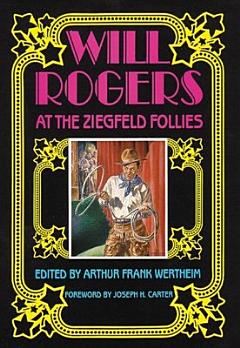Will Rogers and Florenz Ziegfeld are two magic names in show business. Today Rogers is considered America’s most beloved humorist, while Ziegfeld is recognized as the most flamboyant impresario in the history of the American musical theatre.
Rogers was one of Ziegfeld’s greatest comedy stars, performing in six editions of the Follies from 1916 to 1925. "Ziggy gave me my start," he once said. It was on the Follies stage that he began to joke extensively about current events and to poke fun at celebrities.
Will Rogers at the Ziegfeld Follies features the humorist’s writings and poignant observations on society during World War I and the Roaring Twenties. Included in this unique collection are two of Rogers’ most popular books, The Cowboy Philosopher on the Peace Conference and The Cowboy Philosopher on Prohibition. In selections from his weekly articles and The Illiterate Digest, Rogers lampoons the leading figures of the day, from Henry Ford and William Jennings Bryan to Presidents Wilson, Harding, and Coolidge.
In these pages the reader will discover how the Follies brought national fame to Rogers and led him to new careers as a newspaper columnist, film star, radio performer, and popular speaker. His extraorginarily versatile talent is demonstrated by his first syndicated newspaper column, comic routines from his Victor phonograph recordings, a speech to the American Bankers’ Association, and many other witty pieces that are still very relevant to our own time.
Included here are Rogers writings that have never been published: selections from the entertainer’s gag book, notes, and correspondence. In a fascinating exchange of telegrams and letters, the book brings to life the rare friendship between Rogers and Ziegfeld. It also spotlights Will’s relationship with two other famous Ziegfeld comedians, Eddie Cantor and W.C. Fields.
As the only book dealing with Will Rogers on the stage, this volume fills an important gap in the life story of the humorist. Will Rogers at the Ziegfeld Follies recreates an exciting era when audiences laughed at the homespun humor of this legendary national figure-one of the most popular and influential Americans of the twentieth century.

